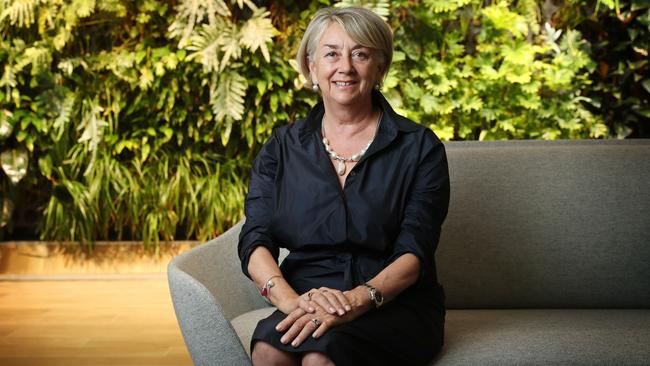Super fund stress testing ramps up as APRA homes in on economic risks
Super funds face tougher scrutiny by the prudential regulator as it pushes funds to stress test their investments heading into an economic downturn, and tips further rationalisation.

Superannuation funds face tougher scrutiny by the prudential regulator as it pushes the industry to conduct detailed stress tests of investments heading into an economic downturn, and tips further rationalisation in the $3.3 trillion sector.
Australian Prudential Regulation Authority deputy chair Margaret Cole said the agency was working closely with individual and groups of trustees to understand how they were navigating the more difficult economic and operating climate.
“Stress testing is something we’re pushing up the scale for super. Banks are very used to it, insurers are somewhat used to it; in super (it is) something we’ve got to push into with them,” she told The Australian.
“We’re very concerned to see that trustee boards of super funds are all over the risks and, in an environment like we have at the moment, liquidity stresses are clearly elevated up the scale of risk … we need to know they are all over the way that their executives are managing those.”
Ms Cole, with 19 months at the regulator, said APRA was communicating and working proactively with the super industry on stress testing and expected improved outcomes for members as a result. “At the end of that cycle if you don’t see positive change we have to, once we’ve asked politely, make them do it.”
Alongside stress testing and assessing the valuations of unlisted assets, APRA is also clamping down on areas including super fund governance, board skills, cyber security and how funds are managing retirement products.
“There is a lot of going on behind the scenes and what we really want to do with super … is reinforce that these things we’ve been saying are not optional, they have to be done,” Ms Cole said. “These are the critically important things and particularly against a backdrop of the economic environment that … is uncertain.
“The promise we want to see fulfilled is managing those (super) funds in the best financial interests of members. That requires careful consideration of the leadership of the super fund by the board and careful consideration of the asset profile and the risks that go with it.”
Ms Cole’s comments come as the Albanese government works to enshrine in law an objective for super and define its purpose. The government is also preparing to make public a review of its super fund performance test, which may be released in coming weeks.

Ms Cole said while she didn’t want to pre-empt the review’s findings, she expected the test would continue in some form.
“Things that the minister (Stephen Jones) has said publicly are that performance tests and benchmarks are here to stay … he’s not abandoning the performance test,” she added.
The government last week signalled it will seek consultation on the Levy report, which recommends a streamlining of regulations to make financial advice accessible and affordable.
But the report raised the ire of consumer advocates, who said its recommendations would expose consumers to a greater risk of poor outcomes.
Lawyer Michelle Levy called for, among other things, the scrapping of requirements for financial advisers to provide detailed statements of advice to clients, and for the easing of requirements around disclosure and consent around fees. Other recommendations were for advice to be provided by a broader range of groups subject to a “good advice test”, and making it easier for super funds to provide more advice to members.
Ms Cole said it was sensible the government was consulting on the report given the importance of financial advice in the economy.
“If something can be done to improve the advice model so that people can have accessible, straightforward advice at the right cost, and in a way that helps them form decisions, that can only be a good thing,” she added.
“Those things at a high-level sound like good recommendations.”
Ms Cole was referring to measures such as amending the Superannuation Industry (Supervision) Act and sorting out how super could be accessed to pay for financial advice.
But Ms Cole also cautioned that allowing access to super to pay for financial advice should be limited. “It’s something you’d need to be careful about, how that worked in practice, because you don’t want to deplete the super fund,” she said.
Ms Cole said her personal view was if that recommendation were to be implemented, a cap on the amount that could be drawn from an individual’s super account should be put in place.
“We haven’t got a (APRA) policy view at the moment, but we definitely have a view that super is there to provide retirement income, there are some exceptions to that. Those exceptions have to be carefully considered and if the … government decided that one of the purposes of the use of super was to provide a capped sum for advice, that’s a government decision.”
Ms Cole said it was important for policymakers to work through the detail of any mooted reform to ensure they protected super fund members’ interests.
Despite a wave of super fund mergers in the past five years, Ms Cole expects further consolidation in the sector.
“If we look out five years, I think there will be more consolidation and … less (fund) numbers there. If that means members are better served through performance that would be a good thing,” she said.
“But of course, what is also important for members is … the quality of service they get. As the bigger enterprises or as entities merge to become bigger, they have to put focus not only on efficiencies and economies of scale for better performance outcomes and returns, but also on their service model.”
Asked if the super sector might traverse a similar road to the oligopolistic banking industry, Ms Cole shrugged off that suggestion.
“We are a long way off that and I personally don’t believe that the model for super will ever end up like the current model for banks,” she said.
“People are more alive to market considerations as mergers reduce the number of participants … There’s going to be space for some very big ones, some big ones, some medium-sized ones and maybe some that have some unique selling point in the community or customer service.”
There are about 140 APRA-regulated super funds in the market offering about 1200 products. APRA regulates $2.25 trillion of the super sector’s total $3.3 trillion under management.




To join the conversation, please log in. Don't have an account? Register
Join the conversation, you are commenting as Logout